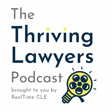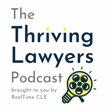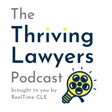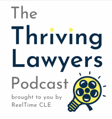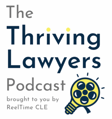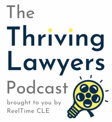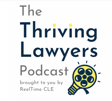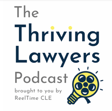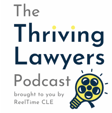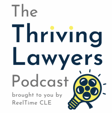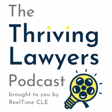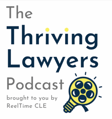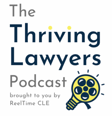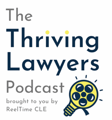Become a Creator today!Start creating today - Share your story with the world!
Start for free
00:00:00
00:00:01

Coleman Cowan-Thriving In and Out of Law-and Back In Again (Pt. 2)
In Part 2 of this interview, trial lawyer Coleman Cowan talks with Chris about his adentures as an award-winning producer for CBS News' famed 60 Minutes program in NYC, as well as the many personal and professional factors that ultimately drew him back to the practice of law in North Carolina. Coleman also shares lessons learned during his time away from law practice that he now deploys in order to "produce" an enjoyable, rewarding, and sustainable law practice while being present with and caring for his family.
PRODUCTION NOTE: This episode was recorded in late 2021, but somehow got lost in the post-production process. But Coleman is a guest for all seasons, and you'll emjoy hearing about his advwentures and lessons learned.
Transcript
Introduction to Coleman Cowan's Career Shift
00:00:00
Speaker
Is audio okay all good Welcome back to the thriving lawyers podcast today. We've got part two of my interview with Coleman Cowan a trial lawyer from Practicing with the Farron is it Farron law firm?
00:00:16
Speaker
James Scott Farron. If you have a TV, you've probably heard of us. There you go. Practicing in Durham, North Carolina, living in Raleigh. And when we left off in the last episode, Coleman was talking about the journey out of law for a time period to follow kind of a dream of being a writer and a journalist. And where we left him, it was kind of in the beginning of
00:00:42
Speaker
trying to put some flesh on that dream and starting to get a taste of the enjoyment of the work, the meaningfulness of the work. And I think we left you, you may still have been in Atlanta working for the Business Journal. And how did it progress from there so that you ended up kind of getting a whole new graduate degree? And then where'd you go career wise from there?
00:01:06
Speaker
When I was at business week and I realized this is what I want to do, I decided, well, I better learn how to do it. So I applied to journalism schools, got into Columbia and went to New York and learned journalism and what became, for me, just the greatest city and a super fun place to live.
Life in New York City and Family Support
00:01:30
Speaker
And it's much like my experience with
00:01:33
Speaker
Do I want to be a lawyer? Do I not want to be a lawyer? You know, much like I, being a lawyer was the last thing I ever wanted to do growing up until I learned what it was all about. New York city was the last place I could ever envision me or my family living until we actually did it. And man, I loved it. And what a great experience. What a great place to go to journalism school and learn journalism, learn how to write and then become a journalist.
00:02:02
Speaker
And we should mention that at some point in time while you're still in North Carolina, was it while you're still in North Carolina, you met the woman who had become your wife, right? And sort of invited her along. If I remember you saying, invite her along on this adventure. What was that like? Yeah, so it's a funny story that she still tells. We met at Sunset Beach just before I left my law practice to try to become a journalist.
00:02:33
Speaker
person that she met that she fell in love with. And as we started dating and realizing that this could become serious was a lawyer. And, you know, as far as she knew a happy lawyer and stable, right. And stable. And then deep into the relationship, I, you know, we had this conversation. I told her, Hey, this is this crazy idea that I have. And I think this is what I'm no longer going to do. And this is what I'm going to do.
00:02:59
Speaker
Uh, and, uh, I think when she got over her initial shock and, you know, to her credit, she came along with me for the journey and, uh, it's been super exciting, but yeah, it was a little bit of a, um, uh, I don't know if it's, you know, pulling the rug out from under her. It came as a surprise, uh, but one that she, uh, fortunately for me, uh, rolled with and, uh, we had a fantastic adventure, um, together in New York and started raising a family there.
Navigating the Journalism Job Market
00:03:28
Speaker
Well, was your son born while you were there then in New York or? Yeah, he was. He was born in New York and he is still fond of saying that he is the one true New Yorker in the family. And he's absolutely right. My wife is from Eastern North Carolina.
00:03:45
Speaker
I can relate. I have one of those, uh, my 23 year old, uh, who lives there and has lived in the city for five years now. Uh, the first time we went on a visit, which I think was 2014, maybe beginning 2015, she was walking around like she belonged there, like on that very first visit. It was like, this is my people. This is my place. And, uh, sure enough, she went back there and some people just absolutely vibe with that city and, and really love it. And there's obviously lots of great stuff going on.
00:04:12
Speaker
So you were at Columbia, and then you're basically doing the whole finishing your graduate degree and looking for work again, which you had done before coming out of law school. What was it like this time? Was it different? Were you looking for different things and kind of where did it take you? Yeah. So here I am at the forever young age of 37.
00:04:37
Speaker
graduating from graduate school again and looking for a job in journalism in the mid 2000s as newspapers were dying and print publications were dying and journalism jobs and especially good journalism jobs were becoming more and more scarce. The deal I made with Angie was we're gonna go, let's go to New York, Columbia, the graduate school program, there's a year. Let's go for a year and see what happens.
00:05:06
Speaker
see where we go from there. Maybe we stay, maybe we go somewhere else, maybe we come back to North Carolina, but let's just see. So I go to journalism school for a year. We get married the summer after I graduate from journalism school. I work for the summer at Business Week Magazine in New York, but that's just a temporary position. And Chris, I'll tell you that business journalism, as important as it is, is not my passion.
00:05:35
Speaker
It was a good way to learn, but that's just not me. So I knew that I wouldn't stay there. We got married, went on our honeymoon, didn't have a job, but we decided we wanted to stay in New York, which meant when I came back, we had a New York City apartment with New York City rent and I didn't have a job.
Opportunity at 60 Minutes and Early Projects
00:06:00
Speaker
Amazingly though, and this is just,
00:06:01
Speaker
It's so funny how things just tend to work out. We landed at JFK coming back from our honeymoon. I turned on my phone and I had a voicemail message from one of my colleagues in the investigative journalism program at Columbia. He had gotten a job at 60 Minutes, which I thought was absolutely fantastic. I was thinking, wow, how did you do that?
00:06:28
Speaker
And the message was, it was a producer at 60 Minutes that said, Coleman, you don't know me from anybody. I'm this producer at 60 Minutes. And Kevin Lavelle, who is my friend and colleague, has given me your master's project. And I'm interested in speaking with you about working on this story and hiring you to work at 60 Minutes. I thought, wow, never thought about working in television. I was always geared towards print.
00:06:57
Speaker
Much like I didn't know anything about journalism before I started. I didn't know anything about broadcast television But my god, it was 60 minutes Yeah, and what was the what was the master's project real quick? What was the master's project about that he had read? so the the New York Police Department In up until actually a couple years ago, you know, they obviously that it's a huge
00:07:24
Speaker
investigative system, a huge criminal justice system. They compile just tens of thousands, if not hundreds of thousands of pieces of physical evidence from crime scenes all around the city, all throughout time. And they store them all in physical warehouses with paper vouchers. There's no computer system. And understandably, a lot of evidence gets lost.
00:07:50
Speaker
That becomes important as DNA technology develops and people who have been convicted of crimes before there was DNA testing and had contested their innocence all along said, hey, there's this technology now. We want you to test it and you can tell that I'm innocent. And that's great if you can find the evidence.
00:08:15
Speaker
It's horrible if you can't find the evidence. And there were a number of cases in New York and really in a lot of places where rape kits, evidence that could be tested just couldn't be found. And there were situations where for years it couldn't be found. And then lo and behold, somebody found this rape kit in the bottom of a barrel in the corner of a warehouse in
00:08:41
Speaker
queens somewhere. And somebody was in jail for 12 years because they couldn't find them. So my master's project was about that. Which portends the... We've had that issue here in North Carolina with backlog in the processing of rape kits that different politicians have said, hey, we're going to try to blow through that. And there's been people trying to cast awareness on. So you were doing a research project on that and wrote kind of that up and
00:09:07
Speaker
what all the implications of that would be. So investigative journalism on something, you know, super, super important, I guess.
The Art of Storytelling and Legal Skills
00:09:13
Speaker
Right. Right. It was, it was a fantastic story that when I got out of journalism school, didn't have an outlet and then all of a sudden it had some interest from 60 minutes and that was my foot in the door there. And much like my experience at business week, I started at the bottom at 37 years old as
00:09:33
Speaker
an editorial assistant, doing research, collecting clips, pulling video and different files for stories. And I was fortunate to eventually work my way up and after a couple years start producing my own stories. And it was just absolutely amazing working with these people that had been at 60 Minutes for 40 years, 50 years, and they were the people that
00:10:00
Speaker
You talked about watching the Dukes of Hazzard in my parents' living room there in Greensboro with, I'm sure you remember the wood paneling that I remember being in that room. I remember sitting on the floor in that same living room every Sunday night at seven o'clock watching 60 Minutes with my parents because that's what was on in our household Sunday nights at seven o'clock. And then here I am, fast forward a couple of decades later, and I'm working with these same people that I used to watch.
00:10:30
Speaker
on television, Morley Safer, Steve Croft, Leslie Stahl, Bob Simon. It was a very surreal experience, but then you quickly have to learn these are colleagues now and they're depending on me. And there's a lot that I need to produce and get my house in order and just get beyond the, I can't believe I'm no longer on the living room floor. And now I'm in Steve Croft's office and he is grilling me about
00:10:58
Speaker
why this story should hold together and it's what an incredible experience.
00:11:04
Speaker
Well, were there similarities as you describe, especially moving up to being like a producer and putting together, assimilating a lot of information, sifting through it, putting it together for the purpose of telling a story, are there some overlaps there maybe with work as a trial lawyer, similarities and ways that you were able to draw upon your legal training to some degree to kind of assist with that process of telling a coherent story. Talk about kind of how those, you know,
00:11:33
Speaker
fed each other or went together at all. Yeah. So there are a number of similarities that helped me both with the transition from law to journalism, but then also my transition from journalism back into law. And one of them you've already hit on. And that is just taking a large complex body of information and making it understandable for someone who may not be an economist, a trader on Wall Street.
00:12:00
Speaker
Or work in government or politics you take this complex body of information and you make it understandable and accessible And it's and that's what you do. That's what I do as a trial lawyer You take a complex body of information and you present it to a jury and that's the other part I think that translates very well between
00:12:23
Speaker
law and journalism and that is storytelling. I never thought about my practice as a trial lawyer, as a storyteller before I worked at 60 Minutes and I learned what good storytelling is from the best people who do that in the business. And that's what we're doing now as trial lawyers. We're telling the story of our client to the jury.
00:12:50
Speaker
You know, whereas before you produce this 12 minute story that goes on TV Sunday nights and you have a broadcast audience of 12, 15 million people, you know, now you put the story together, you put it together the same way. It has the same important elements, but you're talking to a jury of 12 people, not 12 million people, but 12 right there in front of you. And it's, it's the same concept telling a good, compelling story.
00:13:16
Speaker
And then there's also a lot of basic fundamental similarities as well. Interviewing, learning when somebody's being truthful and honest with you and perhaps sometimes when they're not. Those are all skills that translate back and forth between law and journalism.
00:13:35
Speaker
Yeah, and I'm curious too, I asked people a lot of this having both based on my law school experience, but also having taught law school some, how much do you feel like law school as you experienced? And you went to a great law school, but how did you feel you're prepared for those aspects of practicing the interviewing and the interacting with people and what that was going to be like? Did you have clinical opportunities or things that, you know, set you up for that? Or was that something you really had to felt like you figured out more on the job?
00:14:05
Speaker
There were, I had very good clinical opportunities and clinical experiences, but I'll tell you that I didn't really, I think, come into my own as a good interviewer until I was at 60 minutes. And I was interviewing and talking to people all over the world with very diverse and extremely interesting experiences. And it was just being in different situations in different contexts, in different countries, in different cultures.
00:14:35
Speaker
and being able to converse and communicate and draw information out. And when I realized that when I came back and started practicing law that those fundamentals were, I guess those skills were so much more developed when I came back and I appreciated them more than I did before. I think as a young lawyer, you're trying to figure everything out.
00:15:02
Speaker
uncomfortable. You're the greenest, youngest person there. You think everybody's taken advantage of you. You're afraid of failing. You're afraid to take risk and you're afraid that you're going to look foolish and you don't know what you're doing. And looking foolish is going to be really costly as well. I think that's definitely
00:15:20
Speaker
Well, and I like that. That's an interesting topic to me only because I felt like the same thing. I came into law school and I had all these categories, all these boxes of elements. If I have to prove things, then what kind of testimony can I get? What kind of evidence will work to prove these elements? And I think that really colored the way I conducted any interview, whether it's my own client or a deposition.
00:15:49
Speaker
And I only later learned that it was – that's a little bit of a myopic way to focus on it. If you are doing an interview just to seek information, if you have – you already know what information you want and you're kind of going after that,
00:16:03
Speaker
That's very different from being more inquisitive, curious, kind of listening to what the other person says. In fact, I had a moment that was very helpful in my practice. I read an article that was actually published in the ABA Journal litigation section, I think. It was written by a Charlotte lawyer, a lawyer named Woody Knett, a great guy who practices here, still practicing with the Essex Richards firm. He wrote an article and it was called, How to Take Better Depositions and Possibly Improve Your Marriage.
00:16:33
Speaker
And I was hooked by the title and interested in that topic. And so I read it and it was basically, he was kind of proposing what seemed like a radical notion at the time. He said, if you're taking a deposition, listen to the witness and go with them kind of where they go. Ask them follow-up questions. Don't just be
00:16:51
Speaker
hunkered over your sort of list of these things i'm gonna ask and i'm gonna say and didn't you this and didn't you that you know i'm a lot of the way we're talking to cross examination again this is deposition not in front of the jury or anything but when you're trying to learn what happened.
00:17:07
Speaker
And you want, you know, you certainly there's, there's, there's topics you have to address. But he was saying, listen to what the witness says and kind of make it a better experience for them. Put them at ease and you'll be surprised what may happen. And so I started trying and I was actually, uh, you'll appreciate this as a journalist trying a libel case.
00:17:24
Speaker
representing a lawyer who had been absolutely, you know, uh, libeled, uh, false things had been said about her. She was an immigration lawyer and one of the Spanish language papers here locally had printed an article that said, don't go to this woman. She'll take your money, do nothing, and you'll still get deported. And it said it all in Spanish, which was the absolute worst thing that could happen. Uh, it was not true. What they reported was not true. There was a whole lot of, uh, you and I could probably
00:17:52
Speaker
talk for hours another time about what, you know, what was bad about that. But the way the case started really shifting in our favor is when I interviewed the author of the piece. I had thought he was kind of a hack like everybody else and was in on how bad a job they did at the hatchet job of my client.
00:18:11
Speaker
But it turned out as i you know kind of tried this new interview approach was listen to the kind of go to me more about that what about that he had serious journalistic chops he had done all this great reporting and he knew how to do things right. Turned out he had some thoughts and opinions about this place that he ended up working because he was kinda desperate for a job and he was kinda trying to make something work and he gave me great stuff to kind of you know father paper without knowing he was doing it.
00:18:41
Speaker
Anyway, it's a long segue there, but to just illustrate the importance of listening in a different way. It was not mentioned at all in my law school training at all. When I taught law school, it was a lot more fun. I taught a class on interviewing client counseling and I loved sharing with folks. Everybody's not going to say, oh, you're a lawyer and you're here to talk to me. I will be forthcoming and glad to share with you everything that happened. It's usually the opposite.
00:19:09
Speaker
As I'm teaching young lawyers, that's something I stress to them is listen. It's hard taking a deposition to actually listen to the answer and ask a follow-up question because you're so focused on what you want to ask. There's so much that you can miss. But the other thing that I tell young lawyers is stop being so much of a lawyer. Remember, you are a person and you're a human being before you were a lawyer. When you're talking to somebody, when you're talking to a client, even when you're
00:19:39
Speaker
taking a deposition, uh, doing a director cross examination, uh, picking a jury, you're a person, they're a person to just have a conversation with them. Don't talk like you're a lawyer. Don't write like you're a lawyer. That was the hardest thing for me as I moved into journalism was to stop writing like a lawyer. And I had a couple of good editors that just hammered that out of me and
00:20:06
Speaker
I try to help lawyers stop writing like lawyers because it's not that interesting. And do you write differently now having done that? Do you, I mean, when you're writing a legal brief or something that's going to go to a court, even a complaint, do you write it sort of a little bit differently because of that? I write it very differently. I don't write it for me and how I want to write it. I write it for whoever's going to be reading it.
00:20:34
Speaker
And I write it so that they keep on reading it. Not because they have to read it, because they want to keep on reading it. If I write a brief that I know a judge is going to read, I think about, does this judge have a law clerk that's going to go through this and have all the time in the world to do all the research? Or does this judge not have a law clerk? And is he or she going to be doing it on his own, doing the cases on his or her own?
00:21:01
Speaker
What can I do to make it easier to read this brief and absorb it and hopefully agree with the position I'm taking? And there is an art to that that frankly, a lot of lawyers don't get, is they don't write for their audience and write in a way that it's easy to read and that people want to read and understand. It's easy to say it is very hard to do.
00:21:29
Speaker
Well, and we're trained, you know, when we're in law school, we're learning, we would go to legal writing or whatever they call
Return to Law and Family Motivations
00:21:35
Speaker
the class. And we're trying to learn to think like a lawyer, write like a lawyer. And there is the emphasis on the bullet points and covering them all and have citations of authority. And yeah, after you practice, nobody else writes like that. And it can be very constraining. And you can tell when you come across somebody who's
00:21:54
Speaker
you know, not slacking off and not failing to have citations to authority and the important things, but telling a story, crafting it. And one of the things that's huge is, yes, knowing the audience, even the difference between a trial judge as the audience and an appellate judge. Those are different audiences with different things that are on their mind, different questions, different concerns. And even tailoring it to that is something, you know, I don't remember ever being, you know,
00:22:22
Speaker
uh instructed about in in law school or even in my early years of practice uh but i one guy i like a lot i don't know if you follow him up brian garner uh writes a lot for the aba journal uh and writes about that concise writing and making it more personable and and relatable and less you know uh lawyerly and there's a push for doing that in contracts too um just just that humanity side of it though uh it'll help it connect with the jury
00:22:49
Speaker
connect with the judge whatever it is so you mentioned obviously being back in practice and so i tell us about your at sixty minutes your producing did it fulfill first and foremost that that sense of adventure that you wanted you got.
00:23:05
Speaker
It sounds like you got to travel and go some really cool places being involved in some some Amazing stories and you're at freaking 60 minutes. Okay, so it's not like you're you know Some tabloid put out in Queens or something. I mean, this is on a national scale Why in the world did you step away from that and come back of all things to law? And to anybody listening to your podcast and Queens were not picking on Queens. No, we're not taking on I just it was the first burrow I could think of
00:23:35
Speaker
Yeah, I got every bit of adventure that I was looking for. I reported stories and traveled to every continent except Antarctica. I did stories in jungles, in Brazil, on mountaintops, in Australia. I was in Norway. I was in Afghanistan, Africa.
00:23:59
Speaker
Uh, I was just in some incredible places that, you know, of course I never would have been to, but for this job and it fulfilled everything that I was looking for. And I had just an exciting, exciting job. It was a wonderful 12 years. Uh, what I realized though, is that just like the dream that carried me there, that, uh, this dream that I needed to have more adventure. I wanted to have more adventure. I wanted to become a writer and became a journalist.
00:24:29
Speaker
I realized after 12 years that my dream changed and different things were important to me. I was married. We had a son. Our overall family happiness became much more important and that's how the dream changed. I loved what I was doing and I loved the people I was working with and it was very exciting.
00:24:57
Speaker
North Carolina also had a draw on me and my family. And my family's happiness became more important than me seeking all of this excitement. I had fulfilled that I loved it would have been happy to continue that but my dream changed into more of a family fulfilling aspect. Yeah.
00:25:24
Speaker
Every year in New York, we were apartment owners for a while and we were apartment renters for a while. And when we were renting, every year when our lease came up, we'd say, well, what are we going to do? We'd always talk about going back to North Carolina someday. And then we'd renew the lease and have the same conversation the next year. But, you know, much like a lot of things I learned when I got shot, I realized, well, why are we talking about doing this someday?
00:25:52
Speaker
North Carolina is where we want to be. Our family is there. The way of life that we want to pursue now is there. Why? Why are we talking about doing it someday? Let's just do it now. And so we did, you know, I've left this fantastic job and everybody said you're crazy. I said, I've heard this before. I'm pretty confident in this. And so we came back and
00:26:19
Speaker
I had a conversation with one of my old partners, Hoyt Tesner, who is now leading the litigation department at James Scott Farron. And over a number of conversations, all of a sudden I realized that I was considering something that I had not thought once about in 12 years. Not a single time in 12 years that I ever think about going back to practicing law and being a trial lawyer. But Hoyt got me excited about that. Wow.
00:26:47
Speaker
I came back and fortunately what I had done is when I went on this journey, I didn't know how it was going to turn out. So I kept up with my bar dues. I took the first year I was out, I kept up with all my CLE hours until I got the form back and realized if I'm not in private practice and I'm not in the state, I don't need to do this. But I kept up my bar dues every year. And so when I was talking to Hoyt, I contacted the state bar and said,
00:27:15
Speaker
I hadn't been doing this for 12 years. What do I need to do to come back? And they looked at my license and said, well, it's still active. Come on back anytime you want.
Adapting to Law Again and Evolving Life Goals
00:27:22
Speaker
I thought, well, okay. So what I realized though, is that even though the state bar said, yep, you're ready. Come on back anytime you want. I hadn't been doing this for 12 years. I didn't know if I could do it, number one. I'm fortunate and grateful that Hoyt had a lot of confidence in me and was perhaps a little bit smarter about this than I was.
00:27:44
Speaker
But I got back and tried it and you know, so after I think I was away for 12 years, 13 years since I've left my practice. I was back as a trial lawyer and then 13 years and four weeks after I left, I was back in trial. I was fortunate and grateful that a lot of the things that I had learned that I hadn't thought about in a dozen years came back pretty quickly and pretty easily.
00:28:13
Speaker
What I learned after that trial was that just like all those trial skills that came back quickly and easily, so did all the stress and strain that being a trial lawyer, just being a lawyer puts on yourself. And so then I realized, well,
00:28:31
Speaker
I don't have this escape hatch that I used 12, 13 years before. This is where I am. This is where my family is. You pulled the rip cord. You pulled the rip cord before. You may not get that. That I've read again. And you're setting the family on this trajectory. So talk a little bit about that. You and I had a chance to chat once. And I remember I was asking about that. What did you learn? I love the theme I'm hearing, though,
00:28:57
Speaker
the dream changed and just recognize i think that's great for younger lawyers to hear that the things that you want and you're after in your life in your practice are one thing as you're just getting out of school emerging and that may shift.
00:29:14
Speaker
And some of it may be shifts on your own parts of it may be circumstantial shifts changes in family like getting married having a kid for some people it's adopting or fostering or not be able to have kids and having to do other things family members extended families that you have to care for.
00:29:31
Speaker
There can be external forces but there you know that idea of giving yourself that freedom because you had to battle. I'm sure like you said at every move somebody saying you're crazy somebody saying why would you let go of this to go for that and you had to have that sort of.
00:29:47
Speaker
Commitment to this is what we want, you know that's possible for life now. So could you talk a little bit about? To underscore one other thing. What did you sort of pick up about? You know about well-being about kind of taking care of yourself You got out of the legal rat race. You're you're on this journalistic Odyssey, and I'm sure it was I know I had an experience of when I left Practicing law and got to become a professor
00:30:16
Speaker
I hadn't been much of a over worker or work workaholic before that because, you know, the work was fine. It was good. It paid the bills, but I was really into caring for my family and stuff. But when I got to be a law professor and teach full time, it had my heart and I want every class to be amazing and every, you know, project to be, you know, substantial. And I, I actually struggled a lot more with overwork.
00:30:39
Speaker
even after I took a pay cut and went to go do something totally different because my heart was in it. So what did you kind of learn about how to, I don't use the word work-life balance because I don't like work and life being offset against each other.
00:30:55
Speaker
Work-life integration. What did you, you know, discover about how to do life the way you wanted to do it as a journalist, as a lawyer, and then especially how does it look different as you're entering back in? You said all the stresses come back. So what does it look like for you to care for yourself in a good way? But start with, you know, where did any changes come about as you're getting on the journalistic rat race treadmill? So one of the
00:31:23
Speaker
primary reasons that I left my law practice was that I could never leave it. I never left the office. I would physically leave the office, but mentally my mind was always there at home, at night, through the night, on vacations, on trips. My mind was always on what's coming up. What do I have to do? What am I missing? What is somebody going to get me on?
00:31:50
Speaker
I could never mentally leave the office and and even you told me a story about even watching a Tar Heel game one time Yeah, like a really good Tar Heel game and you couldn't you you weren't there and enjoying it This is you know, talk about a light bulb moment. I was Angie my then girlfriend soon to be fianceed now wife and mother of our son
00:32:13
Speaker
We were watching the ACC tournament, the championship game, the ACC tournament, and Caroline was playing. I can't remember who they were playing. And you'll see why in a moment. We're sitting in our living room, in my living room, in Raleigh, watching the game. It's just the two of us. And when the game's over, she turns to me and says, or as she asked me, where have you been? And I look at her like, what are you talking about? We've been sitting right here. We've been watching the game together. She looks at me and she says,
00:32:42
Speaker
Who won? And I look at her and I pause and think, and I don't know, watching the whole game. Uh, but my mind had not been there. It was, uh, back when the ACC championship was on Sunday afternoons and my mind was on everything that was coming up that week. Um, and it was just, it was a,
00:33:10
Speaker
bad moment, but a very good realization that this is what's going on and it's just consuming me and that's That's one of the reasons why I love this because I was I was Consumed by my career and I was single at the time and it was easy To allow it to be consuming one of the things I realized when I was after i've been at 60 minutes for a number of years is
00:33:36
Speaker
as exciting as that was and as much as I loved the work that I was doing and loved thinking about it. When I left the office or left a producing trip, I left the work behind and I was able to enjoy the time with my family. And I had, I remember moments in places where I was in Central Park thinking, oh, this is what it's like. I'm not at work anymore. And this is what it's like to be with my family and enjoy my family and be present.
00:34:05
Speaker
where I am. I didn't have that before. So when I came back and all that stress started coming back and you're waking up in the middle of the night thinking about all the things you have to do, once I came back, I realized I need to solve this problem. As I said, I don't have this escape hatch anymore. Don't feel like that's a one trick pony. You can only use it one time. So I had to figure out a way to fix that problem. And there are a number of things that I did.
00:34:34
Speaker
One of the things that I did is I didn't realize I was doing this, but eventually I realized I was drawing on a lot of experiences that I had with people that I interacted with and interviewed when I was at 60 Minutes and a lot of experiences that they had and things that I had learned from them about how to deal with adversity and deal with stress. And then there were also more, a couple of things that I did just to help my wellbeing and mental health.
00:35:04
Speaker
I took care of myself better. I mean, I've always been very active and run marathons, ultramarathons, and triathlons, but took care of myself, not only physically, but mentally as well.
Mindfulness, Risk-Taking, and Teamwork in Law
00:35:19
Speaker
What did that look like? What are some examples? So, I say this with full acknowledgement that my 30-year-old self is getting ready to roll his eyes.
00:35:28
Speaker
at this, but I started practicing mindfulness and meditation and just spending a little bit of time every day learning how to focus and learning how to relax. And again, with the 30-year-old Coleman eye roll, that has helped and has made a huge difference. I sleep better. I focus better. My mental health is better. My stress level
00:35:56
Speaker
is better. And everything is much more manageable. It's like many things, it's a practice and you work at it. But I found that taking care of my mind is as important as taking care of my body. Other things that have helped have just been perspective and experience. And I'll tell you, one of the greatest lessons I think that I learned when I was away is the importance of failure and being willing to take risks.
00:36:26
Speaker
and not being afraid to fail. Knowing that you will, and that's okay, but learning from it. And I think this is a problem that a number of many young lawyers experience, I certainly had it, that I was afraid of failing, and it froze me. And I didn't take risks.
00:36:50
Speaker
I didn't expand. I didn't learn things because I was afraid to fail. I stayed in my lane and stayed in my box and ticked off my lists and, you know, just kind of got by. I was doing well and people were praising my work, but I wasn't learning and I wasn't growing. And once I learned the importance of being comfortable with failure and taking those risks, a lot of things became much more comfortable.
00:37:19
Speaker
uh, stress was less and I learn more and, and I've grown more. Um, and it's, it's just, yeah, it's this crazy lesson about failure and that that's okay. Um, yeah, it's yes. It,
00:37:37
Speaker
Well, it's super hard for, I think part of it is, you know, you've got to be pretty smart and academically driven to get into and go to law school. And so you're used to succeeding and you got there by, you know, making the good grades and doing everything you're supposed to. And I think we as a profession put a lot of pressure on, you know, especially in litigation and trial work, what we do.
00:38:03
Speaker
The adversary process and then you have your client comes to you and they're like, I'd like you to have fast this and just kind of run some time out. No, they want you to win. And literally winning is the goal. You have to compete. You have to be great.
00:38:18
Speaker
And I think that can turn into a lot of pressure. I know that from working in a couple of different environments. I was in one law firm where, looking back when I was out of it later, there was a fear, just was kind of coloring everything of everything was sort of something to be really worried and really fearful and concerned about. And I ended up working at the law firm ended up being at for 11 years, where they had a different mindset. They're like, Oh, you messed up. Well, that doesn't surprise us because we do too.
00:38:47
Speaker
And I can feel myself just relax like, oh, okay, like, oh, I'm not gonna be the first person to fail, or lose emotion or anything like that. And there's just this different calm that sort of sets in. Quick story, I took some kayak lessons back a year ago. And I had this nice, I was so thrilled that they gave me a guide.
00:39:08
Speaker
My instructor trainer was not some young buck, you know, who was going to tell me at 50 what to do. He had some years on him, knew his stuff. And he said, you know, you got to get ready to swim. Basically a swim is whenever you exit the kayak in a way other than you plans to do such.
00:39:25
Speaker
And he said we have a saying in you know the kayaking field and it's everybody is between swims no matter how good or or new you are at it everybody's between swims even the best you know world-class kayaker and that was helpful that you know put my money is like i can work with that.
00:39:42
Speaker
because as humans, we're going to mess things up. We don't want it to be catastrophic, certainly, and it's not an excuse. I think lawyers, we're fearful, we're so trained to be risk averse and to be spotting the risks and the consequences. But yeah, that's a whole different mindset to be comfortable with trying something. It took me a long time to get there, probably until I was in my 30s, probably through doing educational programs, really, just
00:40:07
Speaker
Let's try something and some things work and some things don't but when they work, it's kind of kind of cool And i'm glad I took the risk instead of listening to the people who said that's crazy. Nobody will do it Yeah, I think it's along with that It's important to understand the risk that is there be willing to take it and control what you can control but realize you're just you're stepping out there and You know you might fail and you need to take this risk
00:40:32
Speaker
uh control what you can control and if you do fail you need to own it but you need to learn from it you don't learn from it then you you're not gaining anything and you're just you're just going to do it again um yeah but yeah failure can be instructive right right having that realization has has helped me immensely and i didn't have that as a young lawyer
00:40:58
Speaker
What, um, uh, it sounds like to you all have a team system. I mean, it's a law firm. I don't know how many lawyers and staff and all you have, but it sounds like there's also a sense you're, you're not trying to do this alone. You guys are taking on pretty substantial high volume of high, high, uh,
00:41:15
Speaker
you know, value cases, people's lives are impacted by the results. That's a lot of weight to bear, but you're not doing it just as, you know, it's the Coleman Show, you have to get it all done. Much like at 60 Minutes, you're part of a team, but you've got, you know, people around you that are helping do that. Is that an aspect of my capturing that right as well? Yeah, that's exactly right. And that helps manage the stress and it helps the client and helps
00:41:46
Speaker
achieve good results in our cases, and it was the same way at 60 Minutes. When I was a producer there, you're working with a camera crew and audio crew and editor, and then you've got executive editors looking at your finished product. So you're kind of in charge of carrying the story from cradle to grave from the story idea all the way to getting it on TV.
00:42:07
Speaker
But it's a team approach and you've got colleagues along the way helping you out. And it's the same thing in our practice at Farron. We work, each case is different, but I have a team that I work with and there's a lot of collegiality and interaction and talking about ideas and talking about the risks. This is what I think we ought to do here. This is where the risk is.
00:42:35
Speaker
A lot of lawyers are smarter than me and have different ideas than me and they might have more experience. They might have less experience, but it all comes together and works really well. Whereas before I was with a big firm, but there were times that I imposed this on myself. I think that I felt like it was me against the world. And I was fearful of what I didn't know. And I was fearful of failing. And sometimes I was fearful of asking the questions that I needed to ask, you know, so,
00:43:05
Speaker
The younger lawyers are being judged for asking those questions. Being judged. That's exactly right. And so the younger lawyers that I work with now, I encourage them to not to have that fear. Don't have a fear of being judged. Don't be afraid of failing. Don't be afraid of risk. Let's talk about it. Let's manage it. But there's a lot of risk in everything that we do. And we just have to come to terms with it and learn from it. And you can.
00:43:34
Speaker
Well, and that's, and that's the kind of thing too. You have to not just pronounce that and say, you know, you can come to me with anything, but then it's, it's, you know, putting your, uh, your behavior right behind that when they do come to you and you have maybe that curiosity and you listen, okay, not, Oh, no, you did this. You're going to cost us a bunch of money, you know, not putting off that vibe, but putting off the vibe of.
00:43:57
Speaker
I'm so glad you came because we can deal with this now and we'll find a way. We're in it together. That changes the whole.
00:44:05
Speaker
character of the relationship and their willingness to come, because they might come back again and say, well, I'll also mess this up. OK, good to know. What you don't want is people feeling like they have to fix things themselves, feeling like they can't say they messed up because they'll be held to pay. And it's counterintuitive for a lot of people. People are like, you know, make sure people know there are consequences for whatever. No, no, no. You don't want to create that culture of fear. I don't think having worked in both a culture of fear and more a culture of
00:44:34
Speaker
you know, we're human, we'll get through this together. It makes all the difference in the world and it's not easy. This is helpful even for me just as I'm a solo practitioner, I've only got one lawyer in my firm now, but I've got to have, you know, I've realized I've got to have staff, I've got to have other people, you know, to help carry this load or else I'm toast. And that's just kind of the way, you know, I operate.
00:45:00
Speaker
So, this has all been super helpful. I want to be mindful of your time, mindful of our time. I did want to mention, circle back around to one thing we talked about beginning, you and I reconnected.
00:45:11
Speaker
because we're working with a committee of the North Carolina Bar Association called the Professional Vitality Committee. Can you tell our listeners what is the PVC and what can we look forward to maybe coming up from the PVC hopefully later this fall in 2021? Yeah, so the Professional Vitality Committee is number one. It's a mouthful. The way I explained it to my wife is it's a committee of lawyers
00:45:41
Speaker
trying to help other lawyers be happy in what they do and avoid some of the pitfalls that are very easy to fall into as you're practicing law. It is a fantastic group of lawyers. It's a North Carolina Bar Association committee. Last year, headed by Erna Womble, this year, Jamie Dean has taken over. One of the things that we're working on for this year is putting together
00:46:11
Speaker
continuing legal education seminar. It's actually going to deal with a lot of the things, Chris, that you and I have talked about on this podcast. Some of the experiences that I've had and some of the things that I've learned and how lawyers can help themselves be better lawyers and be happier lawyers, but more than that, just happier people. Managing stress, managing the adversity, everything that comes with everything that we do,
00:46:41
Speaker
whether or not you're a trial lawyer, a transactional lawyer, what have you, there's a lot of commonality and some of the stress that we all impose upon ourselves. I mean, we're all type A type people. And if you're like me, you impose a lot of that on yourself. So one of the things that our committee is doing is just helping lawyers sort through that. You know, it's not necessarily a
00:47:08
Speaker
Substance abuse kind of thing is just it's I mean, I I personally think about it as more mental well-being and being happy in what you're doing and both in your career and in life and You know you talked about you know The work-life balance and how you know, you don't like using that because it it avoids it implies one takes from the other We have to think about it is I'm constantly searching for it, but I know that I will never get it but it's that
00:47:38
Speaker
journey and that search that keeps me on a good healthy path, I think. Well, and instead of just because the opposite of thinking about it and trying to at least consciously gauge how they're working together and all is default mode is just sort of falling into step with what else, whatever you see other people doing or what you have to do to survive and just kind of get to the next day. And before you know it, 365 next days have passed.
00:48:07
Speaker
and you're still kind of stuck in the same places if we don't take that pause and assess just to say, you know, am I getting out of my legal career what I want? I don't know very many people our age who are still practicing the same place that they started. I don't know many people. I take that back. I'm going to have a guy you may have met, a Wamba lawyer, is going to be one of my next podcast guests, a Mark and Recast in the Charlotte office.
00:48:36
Speaker
He's a fantastic guy and part of the reason I'm having him on is because he's spent almost 30 years in practice with one firm, a big law firm, and that's a very fascinating and unique, interesting story. He's such an interesting guy. And that's what we love on this podcast. Thriving looks different.
00:48:52
Speaker
All different kinds of different for all different kinds of people and as your story shows driving looks different at different life phases and if we can hear that and go that is okay and you don't have to have this linear rise that it neatly fits into a martindale hubble you know.
00:49:08
Speaker
bio format or LinkedIn bio format. There's freedom in that. There's rest in that and opportunities to see what kinds of things we can do. And what do you know? In our case, it ends up we're going to have fun with this program coming up and see hopefully what some more great things the PVC can do. I'm going to have Jamie Dean actually is one of my, I've already told him I want him on this podcast because he's got a fascinating story.
00:49:34
Speaker
and has done some great things in law, but also the kinds of things he's dealt with are just, you know, you take your hat off too.
00:49:43
Speaker
Yeah, I agreed wholeheartedly and I didn't know that he was going to be on your podcast but I will look for that because that is a story I am very interested in hearing. Yes, I've been getting to know him through collaborative law, collaborative law model that we're trying to adopt, take it from family law into the civil case realm and that's a part of the decision a lot of people make in pursuing that is
00:50:05
Speaker
is based on quality of life and based on, you know, what do I want out of practice and do I want to keep arguing? Good news, lawyers out there, if you are somebody who's found yourself, you know, this arguing thing, this battling mindset that we have in litigation, if that doesn't really resonate with you anymore, you don't want to do that, there's things within law you can still do. And lots of us are on journeys of sort of discovering that, and it's refreshing. I've flirted with,
00:50:33
Speaker
Different aspects of different possibilities of leaving all together or not having a practice and i keep coming back for a variety of reasons some of them choice and some of them being you know kind of circumstantial and what what what things are going on. But what i love is there's always within law we're really blessed and fortunate there are ways to reinvent ourselves.
00:50:51
Speaker
There are ways to do things differently that can make the ingredients come together in a better way. And your story, Coleman, is fantastic for that. So thank you for your time here. Thanks for sharing that with us. And I look forward to keeping up with you. And I'm not going to run any ultra marathons with you. I will tell you that. But maybe we'll kick a soccer ball around again sometime. All right. That sounds good, Chris. Thanks for having me on. Thanks so much. And that's our broadcast for this week.
00:51:21
Speaker
Sleep.
